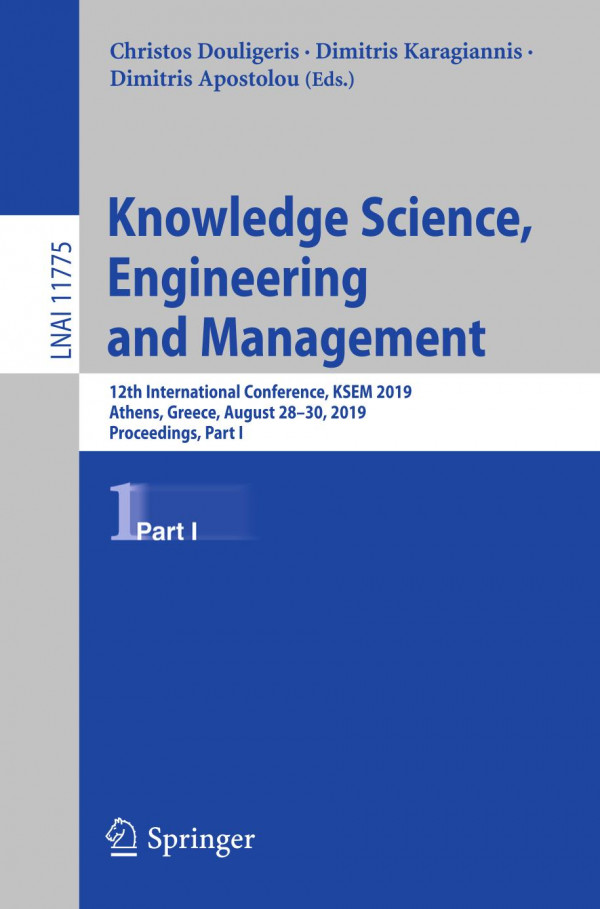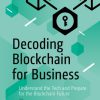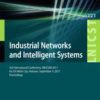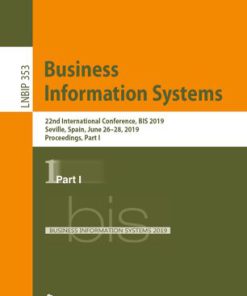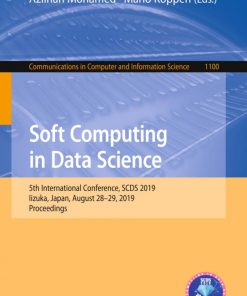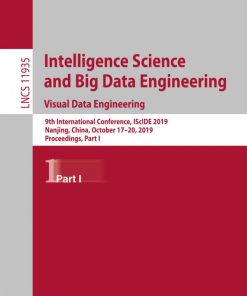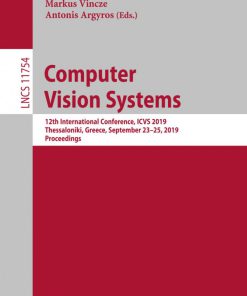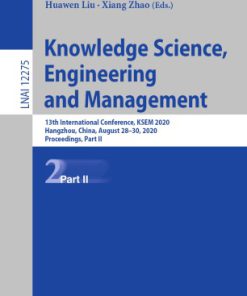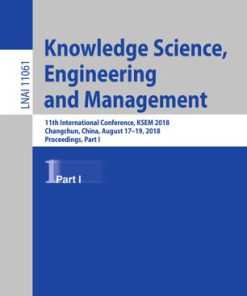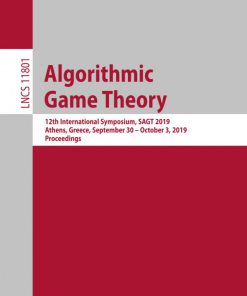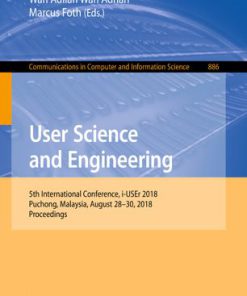Knowledge Science Engineering and Management 12th International Conference KSEM 2019 Athens Greece August 28 30 2019 Proceedings Part I Christos Douligeris
$50.00 Original price was: $50.00.$25.00Current price is: $25.00.
This completed downloadable of Knowledge Science Engineering and Management 12th International Conference KSEM 2019 Athens Greece August 28 30 2019 Proceedings Part I Christos Douligeris
Instant downloaded Knowledge Science Engineering and Management 12th International Conference KSEM 2019 Athens Greece August 28 30 2019 Proceedings Part I Christos Douligeris pdf docx epub after payment.
Product details:
- ISBN-10 : 3030295508
- ISBN-13 : 978-3030295509
- Author: Christos Douligeris (Editor), Dimitris Karagiannis (Editor), Dimitris Apostolou (Editor)
This two-volume set of LNAI 11775 and LNAI 11776 constitutes the refereed proceedings of the 12th International Conference on Knowledge Science, Engineering and Management, KSEM 2019, held in Athens, Greece, in August 2019.
The 77 revised full papers and 23 short papers presented together with 10 poster papers were carefully reviewed and selected from 240 submissions. The papers of the first volume are organized in the following topical sections: Formal Reasoning and Ontologies; Recommendation Algorithms and Systems; Social Knowledge Analysis and Management ; Data Processing and Data Mining; Image and Video Data Analysis; Deep Learning; Knowledge Graph and Knowledge Management; Machine Learning; and Knowledge Engineering Applications.
The papers of the second volume are organized in the following topical sections: Probabilistic Models and Applications; Text Mining and Document Analysis; Knowledge Theories and Models; and Network Knowledge Representation and Learning.
Table of contents:
- Formal Reasoning and Ontologies
- Centralized Reasoning Translation and Its Computing Complexity for Heterogeneous Semantic Mappings
- Inconsistency Handling for Partially Preordered Ontologies: Going Beyond Elect
- Semantic Modeling of Textual Relationships in Cross-modal Retrieval
- A Smart Search-Based Ontology Visualization Tool Using SPARQL Patterns
- Recommendation Algorithms and Systems
- PRTIRG: A Knowledge Graph for People-Readable Threat Intelligence Recommendation
- Social-Aware and Sequential Embedding for Cold-Start Recommendation
- Sequential Recommendation Based on Long-Term and Short-Term User Behavior with Self-attention
- Multi-attention Item Recommendation Model Based on Social Relations
- A Network Embedding and Clustering Algorithm for Expert Recommendation Service
- Mixing-RNN: A Recommendation Algorithm Based on Recurrent Neural Network
- SCCF Parameter and Similarity Measure Optimization and Evaluation
- NRSA: Neural Recommendation with Summary-Aware Attention
- Paper Recommendation with Item-Level Collaborative Memory Network
- Social Knowledge Analysis and Management
- UAFA: Unsupervised Attribute-Friendship Attention Framework for User Representation
- A Simple and Effective Community Detection Method Combining Network Topology with Node Attributes
- Location-Interest-Aware Community Detection for Mobile Social Networks Based on Auto Encoder
- Retweet Prediction Using Context-Aware Coupled Matrix-Tensor Factorization
- A New Multi-objective Evolution Model for Community Detection in Multi-layer Networks
- Jointly Modeling Community and Topic in Social Network
- A Social Relationships Enhanced Credit Risk Assessment Approach
- Context Aware Community Formation for MAS-Oriented Collective Adaptive System
- Data Processing and Data Mining
- ProteinA: An Approach for Analyzing and Visualizing Protein Conformational Transitions Using Fuzzy and Hard Clustering Techniques
- Software Defect Prediction Using a Hybrid Model Based on Semantic Features Learned from the Source Code
- A Novel Method for Highly Imbalanced Classification with Weighted Support Vector Machine
- A Study on Applying Relational Association Rule Mining Based Classification for Predicting the Academic Performance of Students
- Strict Subspace and Label-Space Structure for Domain Adaptation
- Multi-view Locality Preserving Embedding with View Consistent Constraint for Dimension Reduction
- Research on Ship Classification Based on Trajectory Association
- Learning a Subclass of Deterministic Regular Expression with Counting
- Aggregately Regularized Multi-task Matrix Factorization for Household Energy Breakdown
- Learning Continuous User and Item Representations for Neural Collaborative Filtering
- Partial Alignment of Data Sets Based on Fast Intrinsic Feature Match
- Image and Video Data Analysis
- Implicit Rating Methods Based on Interest Preferences of Categories for Micro-Video Recommendation
- An Enhanced Deep Hashing Method for Large-Scale Image Retrieval
- Spatio-Temporal Correlation Graph for Association Enhancement in Multi-object Tracking
- Finger Gesture Recognition Based on 3D-Accelerometer and 3D-Gyroscope
- Deep Learning
- DST: A Deep Urban Traffic Flow Prediction Framework Based on Spatial-Temporal Features
- Small-Scale Data Classification Based on Deep Forest
- A Text Annotation Tool with Pre-annotation Based on Deep Learning
- Object Detection by Combining Deep Dilated Convolutions Network and Light-Weight Network
- D3N: DGA Detection with Deep-Learning Through NXDomain
- Deep Neighbor Embedding for Evaluation of Large Portfolios of Variable Annuities
- State Representation Learning for Minimax Deep Deterministic Policy Gradient
- Low-Sampling Imagery Data Recovery by Deep Learning Inference and Iterative Approach
- Knowledge Graph and Knowledge Management
- Enhancing Graph-Based Keywords Extraction with Node Association
- TransI: Translating Infinite Dimensional Embeddings Based on Trend Smooth Distance
- A Knowledge-Based Conceptual Modelling Approach to Bridge Design Thinking and Intelligent Environments
- Named Entity Recognition in Traditional Chinese Medicine Clinical Cases Combining BiLSTM-CRF with Knowledge Graph
- Adaptive-Skip-TransE Model: Breaking Relation Ambiguities for Knowledge Graph Embedding
- Entity Linking Based on Graph Model and Semantic Representation
- The Model-Driven Enterprise Data Fabric: A Proposal Based on Conceptual Modelling and Knowledge Graphs
- Leveraging User Preferences for Community Search via Attribute Subspace
- Visualization of Customer Satisfaction Linked to Behavior Using a Process-Based Web Questionnaire
- A Multilingual Semantic Similarity-Based Approach for Question-Answering Systems
- From Attribute Relationship Diagrams to Process (BPMN) and Decision (DMN) Models
- Building Chinese Legal Hybrid Knowledge Network
- Machine Learning
People also search:
are engineers scientists
can knowledge be created
can scientific knowledge change
can all knowledge be scientifically tested
did you know facts about engineering
You may also like…
Computers - Computer Science
Computers - Networking


